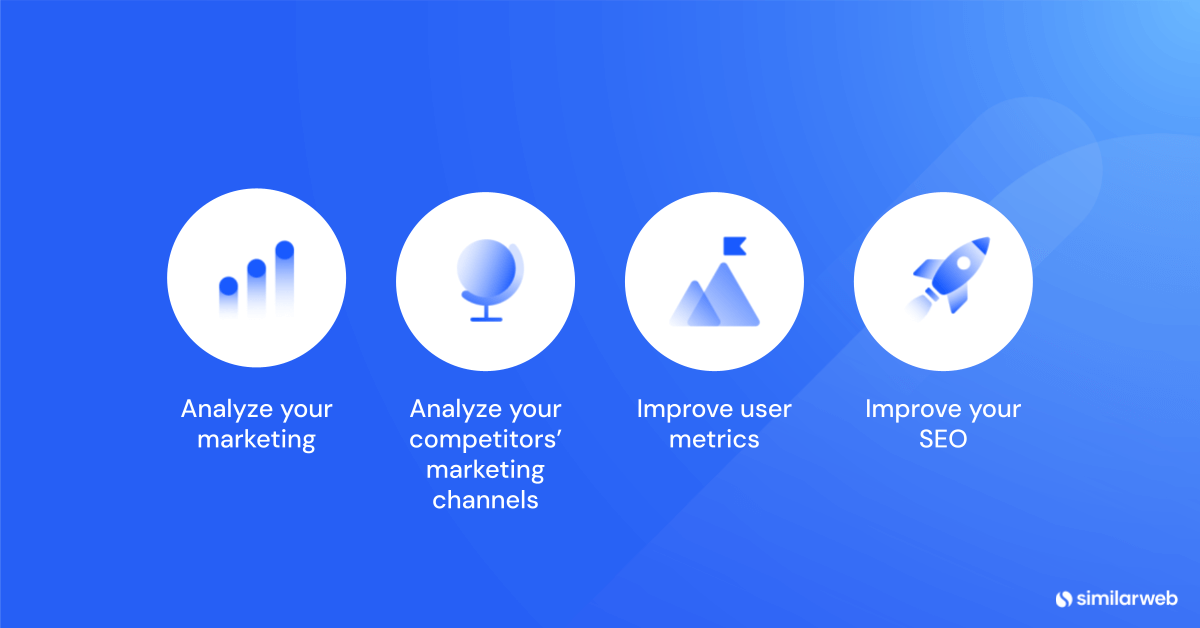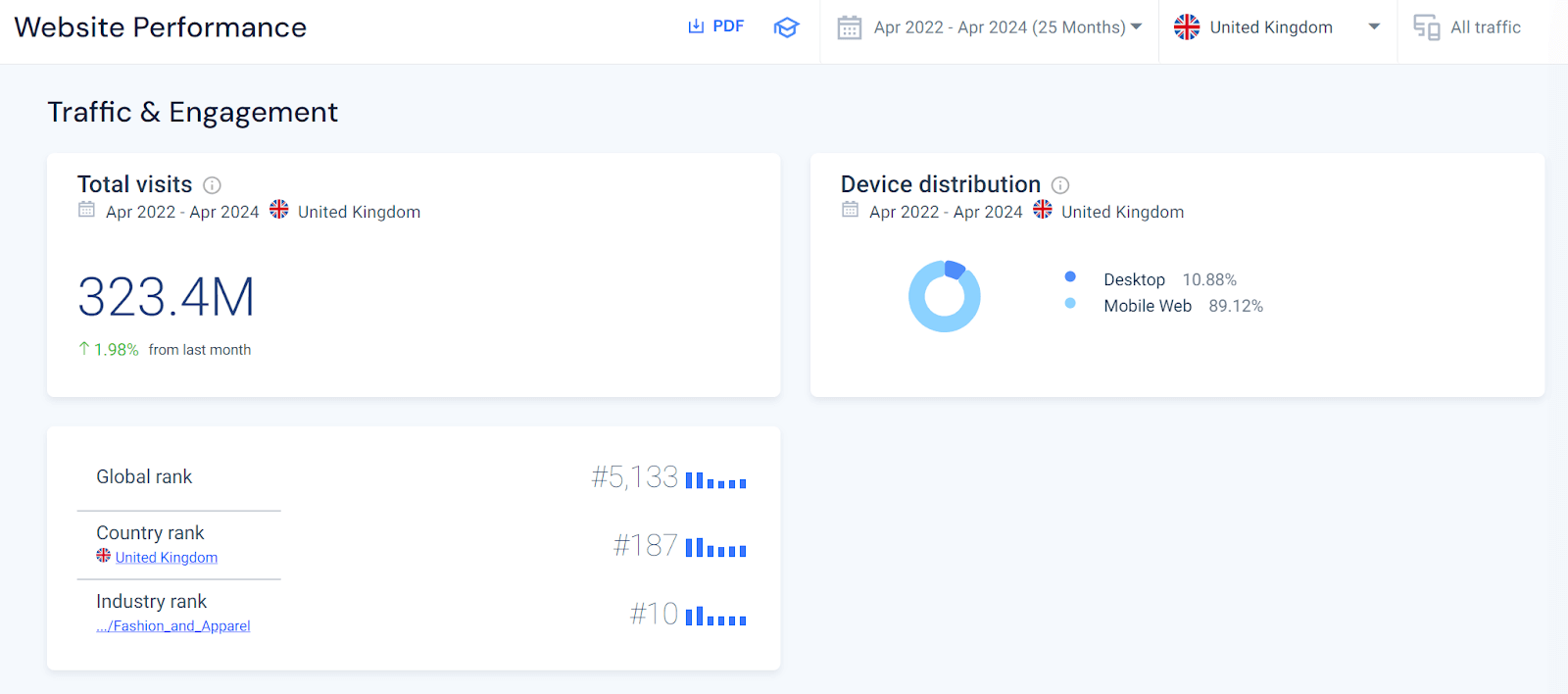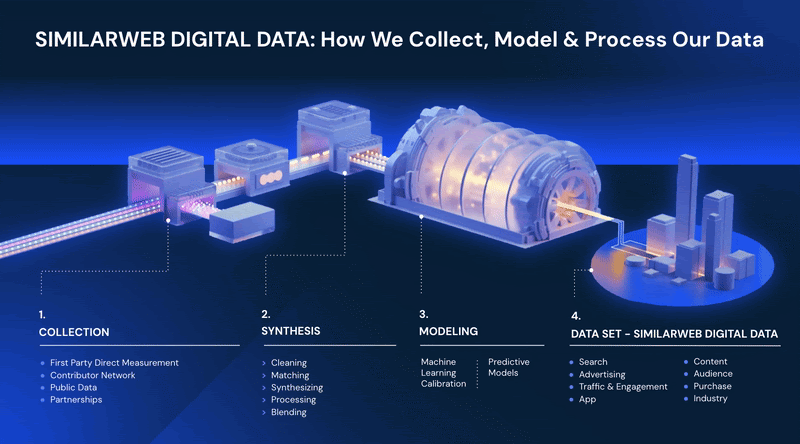Top 10 Website Analytics Tools in 2024

With every passing year digital marketing becomes more competitive. How do you stand out against your competitors? The answer is website analysis.
Website traffic analysis gives you the data to:
- Continuously improve your marketing strategy by understanding what is and isn’t working
- Spot opportunities by understanding your competitors
- Benchmark yourself against your competitors to understand what good content looks like
In this post, we’ll cover the top 10 web analytics tools in 2024 that you can use to beat your competitors and take your marketing to the next level.
What are web traffic analytics tools?
Web analytics tools collect and analyze data about website and app visitors as well as their behavior. This provides valuable insights into key metrics such as conversion rates, traffic sources, audience demographics, and more. By leveraging these insights, business owners can make informed decisions to improve their critical KPIs and ultimately increase market share. If you want to know more, read our full guide on what is website analytics.
Two types of web analytics tools
There are two types of web analytics tools:
1. First-party analytics tools
On-site analytics tools track people who visit your site or app. You activate them by installing a piece of code on your site. With this implemented, you gain access to valuable insights, empowering you to make informed decisions and optimize your site.
2. Third-party analytics tools
Off-site analytics tools gather data from a variety of sources and can be used to analyze any site or online platform. Use these tools to build better marketing strategies by seeing what is working for your competitors. By analyzing your competitors, you’ll be able to find untapped opportunities and increase your market share.
Why should you use traffic analytics tools?
To achieve success in online marketing, you must take a data-driven approach to decision-making and to building and refining your marketing strategies. Leveraging website analytics tools will help you understand what is working for your site and will help you find opportunities by analyzing the sites in your niche.
This will help you:
- Understand your marketing strategy
- Analyze your competitors’ marketing channels
- Improve user metrics
- Improve your SEO
1. Understand what’s working in your marketing strategy
Digital data helps you understand whether your marketing is resonating with your target audience. With this understanding, you can build winning strategies and enhance existing strategies over time.
With a data-driven approach, you can:
- Save hours by focusing on the right strategies at the right time
- Find easy opportunities that are missing out on
- Optimize and improve your campaigns
2. Understand which channels are working for your competitors
The most successful marketers use an omnichannel approach to marketing. The question you need to ask yourself is, what is the best mix to get the outcomes you want? Analyzing channel data of leading sites in your niche will help you find the channels that work for them so that you can spot gaps in your marketing efforts and compete where it counts the most.
3. Improve user experience with in-depth user metrics
In order to make your marketing strategy work, you must understand how your site visitors interact with your content. The better you are able it understand your users, the more you can form a relationship with your audience. And we all know that people buy from people you know, like, and trust.
User metrics will enable you to understand what content your audience loves and what resonates with them the most. What’s more, the right analytics tools will give you insight into who your competitors are by revealing audience:
- Demographics
- Location
- Interests
4. Boost your SEO with strategic content
Using user metrics can refine your SEO strategy and help you build out a high-impact content strategy. Google is always looking for content that satisfies user queries. And Google, as a search engine uses user metrics when calculating where a piece of content ranks in the search results. This means the better your content, the more likely Google will pick your pages to rank in search results to answer user queries.
The top 10 analytics tools
- Similarweb
- Google Analytics
- Mixpanel
- Kissmetrics
- Hotjar
- Microsoft Clarity
- Matomo
- Smartlook
- Woopra
- Adobe Analytics
Understanding each top analytics tool
In the following section, we walk through each of the top 10 tools, discuss the main considerations around using them, and highlight what makes them unique.
1. Similarweb
Similarweb’s powerful website and app analytics tools give you a detailed analysis of any site. These tools enable you to analyze your competitors’ online presence. By comparing key metrics across various industry players, you can gain a deep understanding of your competitor landscape, empowering you to make data-driven decisions and stay ahead of the curve.
Similarweb’s website analysis metrics enable you to:
- Understand how audiences engage with the site’s content with detailed engagement metrics
- Analyze audience metrics such as demographics, geography, and audience interests
- Understand your competitors’ marketing mix by seeing which marketing channels are working for them
- Analyze organic and paid keywords that are bringing traffic to any site
You can access Similarweb’s website analysis data for free with its free website traffic checker. The tool allows you to access one month of data for almost any website on the web including:
- Ranking by traffic
- Traffic and engagement analysis
- Traffic by country
- Demographics
- Audience analysis
- Competitors and similar sites
- Top traffic sources
- And more
Pricing: As mentioned above, Similarweb’s free website analytics tool offers free web analytics. Premium packages start at $125 per month.
2. Google Analytics
Google Analytics is a Google tool that enables you to make data-driven decisions by tracking and reporting website traffic data. It provides insights into how your website performs, revealing:
- User demographics
- Acquisition channels
- Conversion rates
- And more
Key features:
Google Analytics offers a variety of features, including:
- Real-time reporting
- Acquisition reports that show you how users land on your site and how effective your marketing is
- Engagement reports that help you understand what content generates engagement and converting
- Monetization reports show you how much revenue your site generates and from where
Integrations:
To give your data more context, you can integrate your Google Analytics with many platforms, such as:
- Hotjar
- Cloudflare
- Salesforce
- Optimizely
- Leadfeeder
Pricing:
Google Analytics is free and gives you a comprehensive view of your website data. The free version is designed for small to medium-sized businesses. There is a premium version called Google Analytics 360 that’s designed for larger enterprises and organizations that starts at $50,000 per year.
3. Mixpanel
Mixpanel is a software that measures user interactions. Its data is designed to measure whether users on an app or website are getting value. The data is designed to highlight:
- Where users get stuck
- What features are driving conversion, engagement, and retention
Data is presented in custom reports and measures engagement and retention.
Key features:
Mixpanel measures user behavior by tracking every action a user takes on a site as an event. Each event can contain custom dimensions or properties. This enables you to analyze highly specific data segments which enable you to find the data you need.
Integrations:
The platform has a large number of integrations, including:
- Google Cloud
- Braze
- Sprig
- Figma
- And more
Pricing:
There is a free plan that gives you analytics essentials. If you need more features, the premium offer starts at $28 per month.
4. Kissmetrics
Kissmetrics is an analytics platform focused on tracking and analyzing user behavior. By providing event-driven data, it empowers businesses to gain insights that can drive growth and optimize customer experiences.
Key features:
Embracing a user-centric approach to analytics, Kissmetrics tracks individual user behavior, providing insights such as:
- Who your users are
- How users are acquired across different channels
- Which features and areas of your site/app see the most engagement
This allows you to see what motivates website users to convert and find obstacles to conversion. It also helps you increase retention by revealing the indicators of commitment and churn.
Integrations:
Kissmetrics integrates with a large number of platforms, including:
- Appcues
- Chargify
- Hubspot
- Magento Go
- Help Scout
- Callrail
- Call Tracking Metrics
Pricing:
Kissmetrics standard business account starts at $25.99 per month.
5. Hotjar
Hotjar uses heat maps to show you how your web audience interacts with your site. This gives you the evidence you need to improve your content and optimize it for actual users.
Key features:
Hotjar heatmaps show you:
- What your users click on
- How far your users scroll
- Where users move their mouse to
For more visibility into how users interact with your site, Hotjar shows you engagement zones and analyzes user sentiment.
Integrations:
Hotjar integrates with a number of platforms so that you can run experiments and share data. Integrations include:
- Slack
- Microsoft Teams
- Google Analytics
- Zapier
- Jira
- Hubspot
Pricing:
There are many pricing options available. The Basic package is free and offers many features, including heat maps and recording sessions. If you need more features, the Plus package starts at $32 per month.
6. Microsoft Clarity
Microsoft Clarity offers you heatmaps and session recordings to give you a clear understanding of how users interact with your site. The tool will give you insight into:
- How people use your website
- What is currently working
- Where users are getting stuck
Key features:
Clarity metrics are designed to help you pinpoint where your users get frustrated so that you can turn your problems into opportunities. Metrics include:
- Dead clicks
- Rage clicks
- Scroll depth
7. Matomo
Matomo is a web analytics platform that focuses on data privacy. The tool is designed to show you who your audience is and what their needs are so that you can optimize your content and increase your digital marketing ROI.
With it, you can see:
- What content works
- How engaged your audience is
- Which marketing channels give you the highest ROI
Features:
The platform offers a wide range of analytics features, including:
- Conversion optimization: Analyze the user experience on your site with heatmaps, session recordings, form analytics, goals, and more
- Visitor profiles: evaluate every action a user has taken on your site
Integrations:
Matomo integrates with 100+ platforms such as content management systems, forums, online shops, and more. Integrations include:
- WordPress
- PhotoDeck
- Drupal
- Joomla 3
Pricing:
Matomo has two pricing options. If you host it on your servers, it’s free. If you want it hosted on Matomo’s servers, pricing starts at €22 per month, depending on your monthly traffic volume.
8. Smartlook
Smartlook gives you both quantitative and quantitative data so that you can understand what users are doing on your site and why they are doing it.
Key features:
Smartlook’s platform is broken up into four main capabilities:
- Session recorder automatically records user sessions so that you can see how they behave at the time when they drop off your funnel
- Events feature records every event without the need to set them up manually
- Funnels allow you to track user behavior through all the steps of a funnel
- Heatmaps help you understand how far users scroll and what they click
Integrations:
With Smartlook, you can broaden your competitive analysis by integrating with popular tools like:
- SalesForce
- Jira
- Mixpanel
- Slack
- Zendesk
- Intercom
Pricing:
There is a free plan that gives you 3000 monthly sessions a month and some basic features. If you need more, there is a pro plan that starts at $55 per month.
9. Woopra
Woopra is a web traffic analytics platform that is designed to give you a 360-degree view of the paths users take on your site. The platform allows you to see aggregate data over millions of users, right down to single user profiles. This helps you to understand how each user engagement impacts your sales funnels.
Features:
Woopra’s main features can be broken down into three parts:
- Journey Analytics helps you discover opportunities and customer obstacles at every point in the user journey
- Trends Analytics allows you to analyze how any metric is trending over time so that you can uncover what actually drives performance
- Retention Analytics enables you to reduce churn by measuring how your users engage with your features over time
Pricing:
The Core package is free and allows you to analyze 500k actions per month. If you need more actions or more features, the Pro package is $999 per month. There is also an enterprise option.
10. Adobe Analytics
Adobe Analytics is a popular website analytics tool that offers you insight into how your audience behaves with real-time insights and historical data. This data will help you make immediate decisions or design long-term strategies to better convert your visitors.
Features:
Adobe Analytics does more than just present basic user data. It uses machine learning to gather a wide range of data and present it in an easy-to-understand format. What’s more, it can gather data from any source, even offline data.
The platform gives you:
- Advanced segmentation
- Real-time data visualizations
- Cross-system workflows
Pricing:
Adobe doesn’t publish pricing details on its website, meaning it is likely customized per customer needs.
Why using traditional website analytics tools is not enough
In a world where the barrier to entry is low, competition is fierce. This means that only using traditional web analytics tools that track visits to your site is not enough to achieve success. You must also understand your competitive landscape. Although traditional analytics tools are a powerful way to improve your user experience and conversions, they only give you a fraction of the story.
Without accurate and regularly updated competitor data, you are left in the dark about what digital strategies and marketing tactics your competitors are using to achieve marketing success.
Top website analytics tools: The final word
Data is your secret weapon as a digital marketer. It can give you insight into every aspect of your marketing, from the big picture to the minute details that will help drive your users down the sales funnel.
The more comprehensive your data, the more you are likely to find insights that help you outmaneuver your competitors.
Similarweb digital data gives you a 360-degree view of your marketing covering everything, including:
- Broad market analysis
- Website analytics
- SEO metrics
- PPC analysis
FAQs
How does Similarweb track web traffic?
Similarweb tracks web traffic through data it gets from four main sources:
- Direct measurement: Millions of apps and websites share their first-party data
- Contributory network: Consumer products aggregate anonymous behavioral data
- Partnerships: Digital signals collected by a global network of organizations
- Public data extraction: Indexed public data captured from billions of websites and apps by an advanced algorithmic engine
What is the Similarweb tool used for?
Similarweb is a market intelligence platform that offers comprehensive analysis for any website or app on the web. It can be used for:
- Market analysis
- Website analysis
- Market research
Your full marketing toolkit for a winning strategy
The ultimate solution to help you build the best digital strategy





















